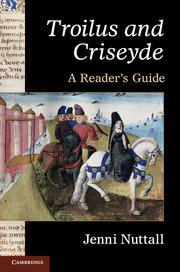Book I
Published online by Cambridge University Press: 05 January 2015
Summary
Lines 1 to 56: the poem’s subject and purpose, and prayers
Though they are not formally labelled as a proem (a separate introductory preface), the poem’s opening lines establish its subject, purpose and implied audience before the narrating first-person turns to the initial events of the story. He addresses his audience in the second-person plural, ostensibly speaking to a group of lovers who are listening to him recite his poem (5, 30 and 54). He tells them that he will recount the twin sorrows suffered by Troilus, son of King Priam (these being the sorrow experienced after falling in love with Criseyde and the sorrow of being first separated from and then betrayed by her). This will be the story of how Troilus’s fortunes changed from sorrow to happiness, before returning once again to sorrow. The narrating voice, who weeps as he composes these lines, prays for help in composing such sorrowful poetry not from a Muse but rather from Tisiphone, one of the Furies, both tormentor and herself tormented. In classical mythology, the three Furies were predominantly agents of vengeance, sent from the underworld to punish wrongdoers, but in some depictions they themselves were also endlessly suffering. Protagonist, narrating voice and presiding deity are united by their shared sorrow.
The narrating first-person prays to Tisiphone because he does not dare appeal directly to the God of Love (who might more obviously aid the writing of a love story, though perhaps not one which ends in sorrow) for success in his literary venture. This is because of his own ‘unliklynesse’ (16), his unworthiness or unsuitability to be either a lover himself or even a writer about love. He identifies himself humbly as someone whose role is secondary and inferior, serving those who themselves serve the God of Love. The narrator of Boccaccio’s Il filostrato, by contrast, begins his story by praying to his own lady, who has become a kind of muse and deity to him. The narrator and his lady are apart and it is the sorrow caused by her absence which provokes Boccaccio’s narrator to retell the story of Troilo’s sorrows. Whereas Boccaccio’s narrator uses the story to give expression to his own troubles, Chaucer’s narrating first-person sees himself as the means by which other lovers can lament their own unhappinesses through hearing about Troilus’s double sorrows.
- Type
- Chapter
- Information
- 'Troilus and Criseyde'A Reader's Guide, pp. 8 - 34Publisher: Cambridge University PressPrint publication year: 2012

